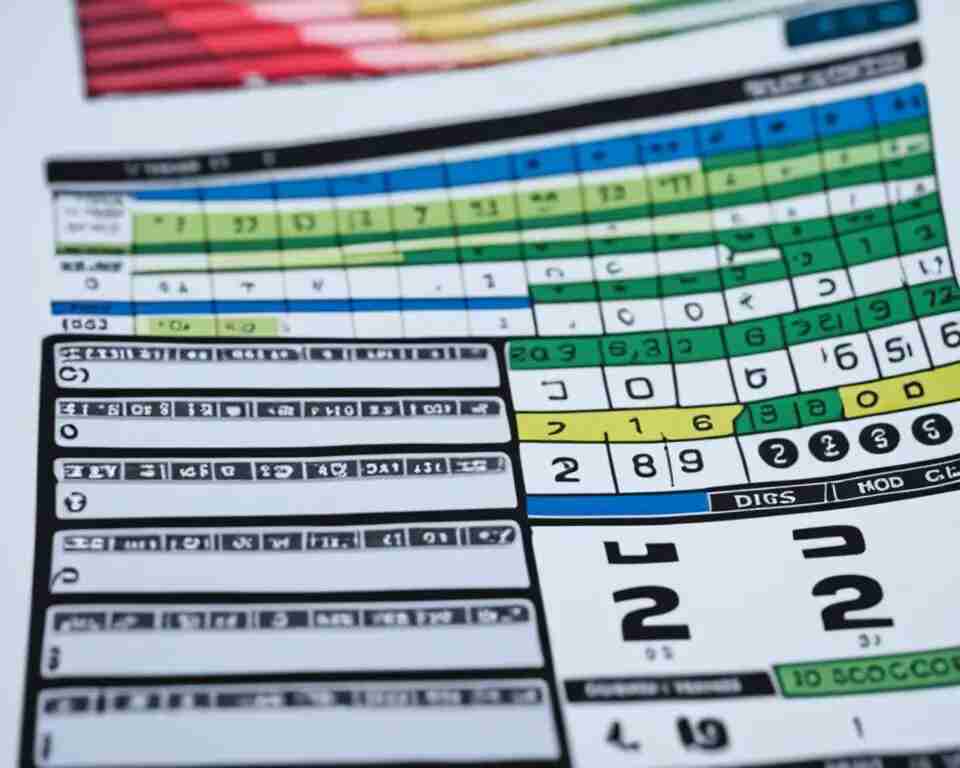Have you ever wondered how disc golf scores are calculated? Are you curious about how players of different skill levels compete fairly on the course? In this comprehensive guide, I will unravel the mysteries of the disc golf handicap system.
From the scoring and calculation methods to the determination of handicaps, we will explore every aspect of this essential component of the game. Get ready to dive deep into the world of disc golf handicapping and discover how it adds a new dimension of challenge and fairness to the sport.
Key Takeaways:
- Understanding the disc golf handicap system is crucial for fair competition.
- The system allows players of different skill levels to compete on an equal footing.
- Disc golf ratings and handicapping help determine a player’s handicap.
- Calculating handicaps involves various elements, such as course difficulty and player performance.
- The disc golf handicap system promotes fair play and encourages improvement.

Understanding the Basics of Disc Golf Handicap
In disc golf, understanding the handicap system is essential for both casual and competitive players. In this section, I will explain the basics of disc golf handicap and its significance in the game.
A disc golf handicap is a numerical representation of a player’s skill level that allows for fair competition across different skill levels. It is calculated based on a player’s average scores relative to the course’s difficulty.
The handicap calculation takes into account the player’s average score, the course’s difficulty rating, and the average score of the best players to establish a benchmark. The difference between the player’s average score and the benchmark score determines their handicap.
The handicap serves as an equalizer, enabling players of varying skill levels to compete on a level playing field. A player with a high handicap receives additional strokes, while a player with a low handicap has fewer strokes to complete the course.
Disc golf ratings are an integral part of the handicapping process. Ratings are assigned to courses and players based on their performance. The ratings provide a standardized measurement of skill level and are used to calculate handicaps accurately.
By considering the disc golf ratings, the handicap system ensures that players are accurately matched against others of similar skill levels. This promotes fair competition and allows players to gauge their performance against their peers.
Understanding the basics of disc golf handicap will allow you to appreciate its role in maintaining fair play and enhancing the overall disc golf experience.

Does Disc Golf Have a Handicap?
In the world of disc golf, many players often wonder if the sport has an official handicap system. Disc golf, like traditional golf, relies on scoring systems and ratings to evaluate player performance. However, unlike traditional golf, disc golf does not have a standardized handicap system in place.
Reasons Behind Lack of an Official Handicap in Disc Golf
There are several reasons behind the absence of an official handicap system in disc golf. One of the main challenges lies in the unique nature of the sport. Disc golf courses vary greatly in terms of design, layout, and difficulty, making it difficult to establish a consistent handicap calculation formula that can apply universally.
Additionally, disc golf is a relatively young and rapidly evolving sport. As the sport continues to grow and develop, the focus has primarily been on establishing tournament standards, rules, and regulations rather than a standardized handicap system.
How Traditional Golf Handicap Systems Influence Disc Golf
Despite the absence of an official handicap system, disc golf draws influence from traditional golf handicap systems. Many disc golfers use the concept of a handicap as a way to measure their skill level and compare it to others. Some disc golf leagues and tournaments even incorporate unofficial handicap systems that players can choose to participate in.
However, it is important to note that disc golf handicap and average score are not interchangeable terms. While an average score represents a player’s typical performance, a handicap takes into account various factors like course difficulty and player rating to assess relative skill levels.
While disc golf may not have an official handicap system like traditional golf, many players still find value in using a handicap to gauge their performance and track their improvement over time.
Calculating Your Disc Golf Handicap
In order to determine your disc golf handicap, it is important to understand the role of disc golf ratings and how they impact the calculation. Additionally, factors such as Scratch Scoring Average (SSA) and Scratch Scoring Estimate (SSE) play a significant role in determining your handicap. Furthermore, handicap adjustments can be made based on course and player performance. Let’s dive into the details.
Disc Golf Handicap Calculator
Understanding Disc Golf Ratings and Their Impact on Handicap
Disc golf ratings are numerical values that represent a player’s skill level. These ratings are calculated based on previous rounds played and take into account factors such as course difficulty, weather conditions, and player performance. The higher the rating, the better the player’s skill level. When calculating your handicap, your disc golf rating will be used as a foundation.
The Role of Scratch Scoring Average (SSA) and Scratch Scoring Estimate (SSE)
Scratch Scoring Average (SSA) is a measure of the expected score for a highly skilled disc golfer on a particular course. This value is used to determine the baseline for calculating handicaps. Scratch Scoring Estimate (SSE), on the other hand, is an estimate of the expected score for a player with a rating equal to the course’s SSA. SSE is used to compare a player’s performance to the expected score based on their skill level.
Handicap Adjustment Through Course and Player Performance
Handicap adjustments can be made based on both course and player performance. If a course is particularly challenging or has unique features that may affect scoring, adjustments can be made to reflect these factors. Additionally, if a player consistently performs above or below their handicap, adjustments can be made to ensure fair competition. Handicap guidelines are used to determine the appropriate adjustments based on these factors.
Understanding how to calculate your disc golf handicap is essential for participating in competitive play. By taking into account disc golf ratings, Scratch Scoring Average (SSA), and adjustments based on course and player performance, you can determine your handicap and level the playing field. Use a reliable disc golf handicap calculator or consult the disc golf handicapping guidelines to assist you in the calculation process.

Conclusion
In conclusion, the disc golf handicap system provides a fair and equitable way to level the playing field in competitive play. By assigning handicaps based on individual skill levels, this system ensures that players of all abilities can compete on an equal footing. This promotes inclusivity and encourages players to improve their skills, knowing that their handicap accurately reflects their performance.
The disc golf handicap system is crucial in determining the level of competition in tournaments and leagues. It allows players to compare their performance against others and offers a measure of progress over time. By analyzing disc golf ratings and utilizing scoring averages, players can accurately calculate their handicaps and track their improvement.
For those interested in participating in disc golf tournaments or leagues, understanding and utilizing the handicap system is essential. It allows players to compete with others at similar skill levels and provides a fair and enjoyable experience for all. Whether you’re a beginner or an experienced player, the handicap system ensures that every round of disc golf is engaging and competitive.
In summary, the disc golf handicap system is a valuable tool in the disc golf community. It promotes fair play, encourages skill development, and enhances the overall enjoyment of the game. By utilizing the disc golf handicap system, players can engage in friendly competition, measure their progress, and continually strive to improve their game.


